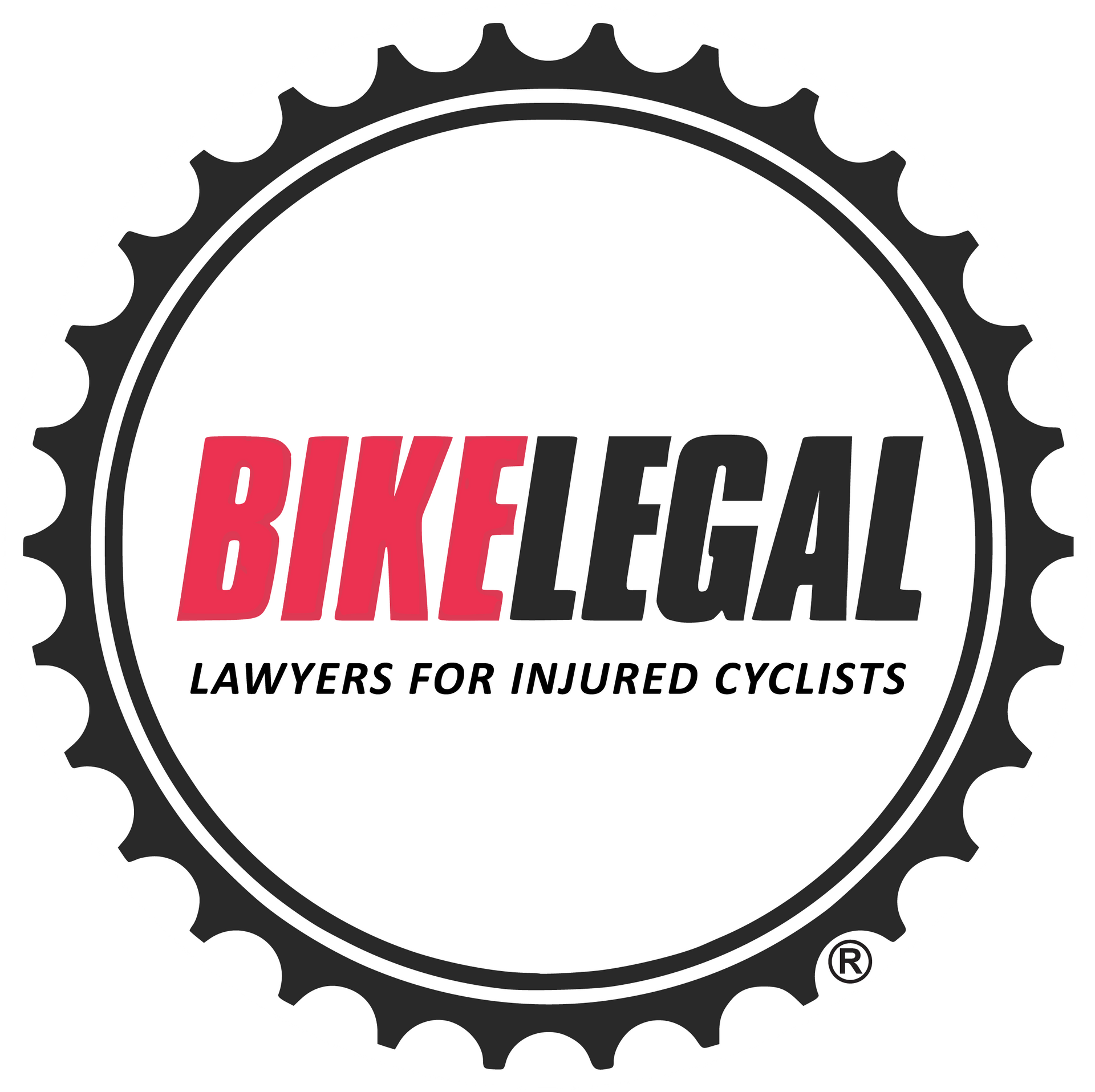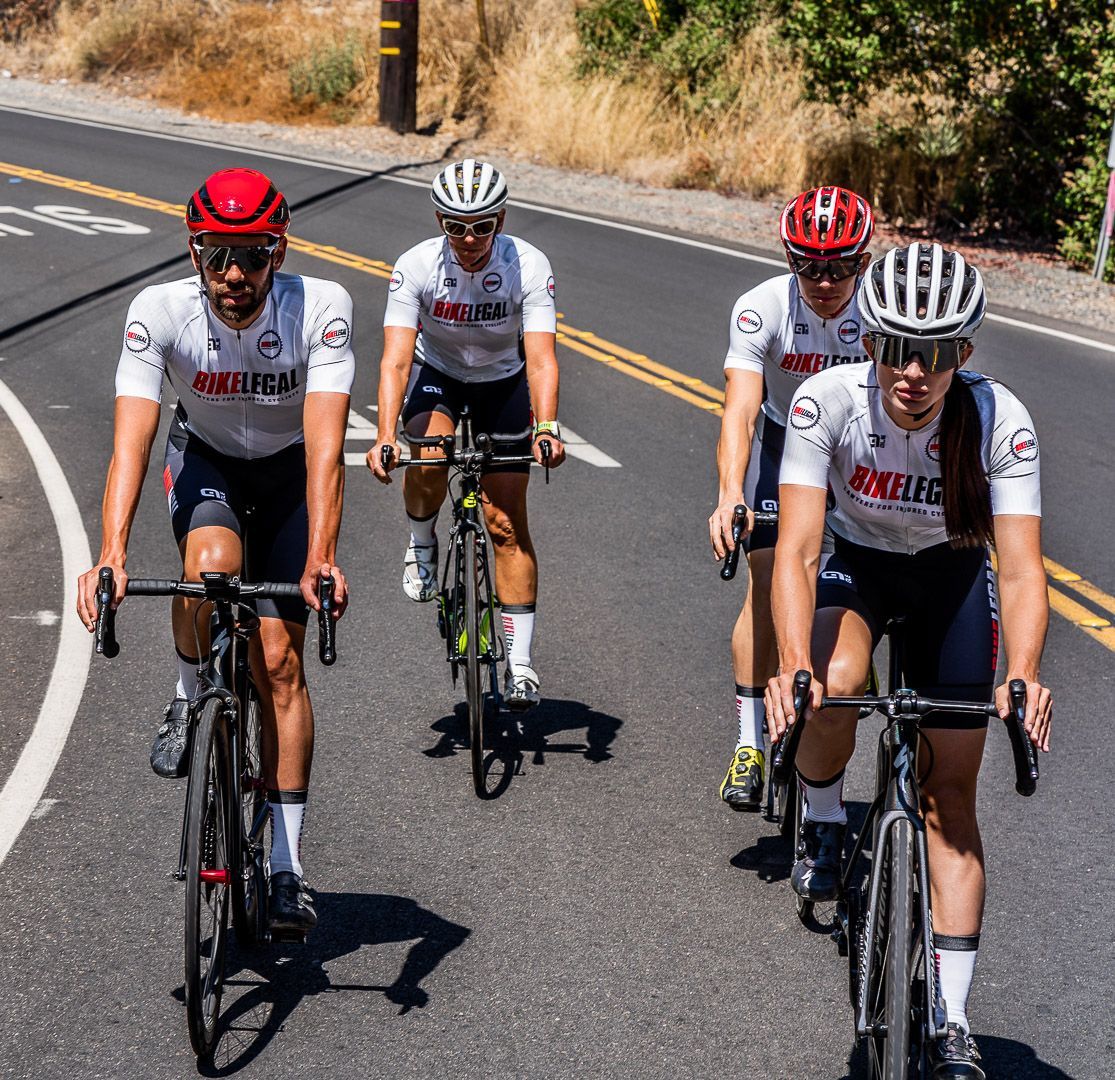New California Law Bans Speed-Modifying Devices for Electric Bicycles: What Assembly Bill 1774 Means for Riders and Retailers
Follow us on
social media!
California has taken another step to address the growing concerns around electric bicycle safety. On July 2, 2024, Assembly Bill AB 1774 was signed into law, amending Section 24016 of the California Vehicle Code. The bill prohibits illegal modifications to e-bikes that increase their speed beyond the legal limit and bans the sale of speed-modification products to uphold safety regulations.
This legislation aims to close enforcement gaps, reduce injuries, and keep e-bikes within their intended classification, preserving their legal advantages while promoting road safety for all users.
Background: Existing Law on Electric Bicycles in California
The existing law defines electric bicycles under Vehicle Code Section 312.5 as bicycles with operable pedals and an electric motor of less than 750 watts. The state recognizes three e-bike classifications:
- Class 1: Pedal-assist only, max speed 20 mph
- Class 2: Throttle-assisted, max speed 20 mph
- Class 3: Pedal-assist, max speed 28 mph, with a speedometer
Previously, riders were prohibited from modifying e-bikes to exceed speed thresholds unless they also updated the classification label to reflect the change. However, the law did not specifically ban the sale of aftermarket "speed hack" devices, creating a significant loophole in enforcement.
This classification system, established under California Vehicle Code Section 312.5, provides critical legal advantages to e-bike riders, including exemptions from registration, licensing, and insurance requirements that apply to motor vehicles.
For a comprehensive overview of electric bicycles and how they work, read our guide on Everything You Need to Know About E-bikes (Electric Bicycles).
What AB 1774 Changes
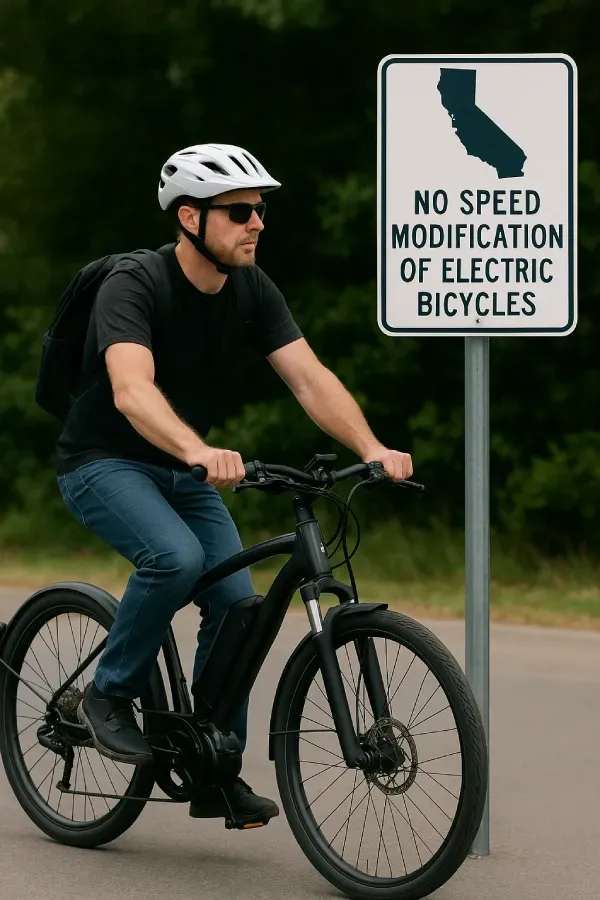
The new legislation makes several significant adjustments to California's e-bike regulations. These changes aim to prevent dangerous modifications while still allowing legitimate e-bike use on California roads.
Prohibition on Illegal Modifications
AB 1774 clarifies that riders may not modify an e-bike to exceed legal speeds unless the bike still meets the definition of an e-bike and is properly relabeled. If the modified bike no longer qualifies as an e-bike under California law, it becomes classified as a motor vehicle, subject to additional safety regulations.
This means that modifications that push an e-bike beyond its class limitations (exceeding 20 mph for Class 1 and 2, or 28 mph for Class 3) would require e bike owners to comply with all motor vehicle requirements—including registration, insurance, and applicable licensing.
🟡 Open Question: How will law enforcement ensure private owners do not tamper with their e-bikes post-sale?
These regulations align with other local initiatives, such as Santa Barbara Updates Bicycle and E-Bike Laws [2025]: New Regulations and Penalties, which aim to enhance road safety.
Prohibits Sale of Speed-Enhancing Devices
The most significant change in AB 1774 is the explicit prohibition on selling products designed to modify e-bike speeds. Retailers, distributors, and online sellers are now prohibited from selling any product that enables an electric bicycle to exceed the legal speed limit or power output.
This provision targets the growing market of "speed hack" devices, controller modifications, and other aftermarket products that allow riders to bypass factory speed limitations. These products have become increasingly popular and accessible through online marketplaces and specialty shops.
🟡 Open Question: With so many of these products available online, how will California monitor and regulate digital marketplaces?
Reinforces Equipment Standards
AB 1774 reaffirms that all e-bikes must comply with the safety standards established by the United States Consumer Product Safety Commission (16 C.F.R. 1512.1 et seq.). These standards ensure that e-bikes operate safely, particularly regarding the disengagement of the electric motor when braking.
The law emphasizes that safety features must remain intact and functional even when modifications are made to the bike's classification. This ensures that the safety mechanisms aren't compromised when adjustments are made to the bike.
Clarified Exemptions
The law reinforces that as long as an e-bike remains legally classified within one of the three established categories, riders are not required to:
- Register the bike
- Carry insurance
- Hold a driver's license
However, once illegally modified beyond these classifications, these exemptions no longer apply, and the e-bike becomes subject to all motor vehicle regulations under the California Vehicle Code.
Legal and Enforcement Implications
Violating AB 1774 is a criminal offense under the California Vehicle Code. This applies to:
- Riders operating illegally modified e-bikes
- Retailers selling prohibited speed-modification devices
Because this new law creates and redefines criminal behavior, local agencies are responsible for enforcement. However, the state will not reimburse local agencies and governments for costs associated with implementing the law.
This means city police departments and county sheriff's offices will need to incorporate e-bike regulation into their existing enforcement activities without additional funding. Officers will need training to identify illegally modified e-bikes and understand the technical aspects of speed modifications.
🟡 Open Question: How will cities, counties, and local governments manage the unfunded enforcement burden created by this law?
How This Affects Riders and Retailers
Assembly Bill 1774 establishes clearer boundaries between legal modifications and those that transform an e-bike into a motor vehicle, affecting purchasing decisions, retail inventory, and enforcement practices throughout the state.
For Riders:
- Modification Compliance: Riders who modify their e-bikes must ensure the changes keep the bike within legal class limits.
- Legal Risks: Operating an illegally modified e-bike can result in fines, confiscation, or criminal charges similar to those for unregistered motor vehicles.
- Loss of Legal Privileges: E-bikes modified beyond legal definitions lose the exemptions that make them a preferable alternative to motorcycles or mopeds.
✅ Tip: If your e-bike goes over 28 mph or uses a motor above 750W, it no longer qualifies as an e-bike.
For Retailers:
- Sales Restrictions: Retailers must stop selling devices that enable speed or power modifications beyond legal limits.
- Criminal Penalties: Selling banned modification devices may lead to criminal charges under the new law.
- Inventory Compliance: Retailers should review and update product listings and stock to comply with AB 1774.
Broader Safety and Policy Implications
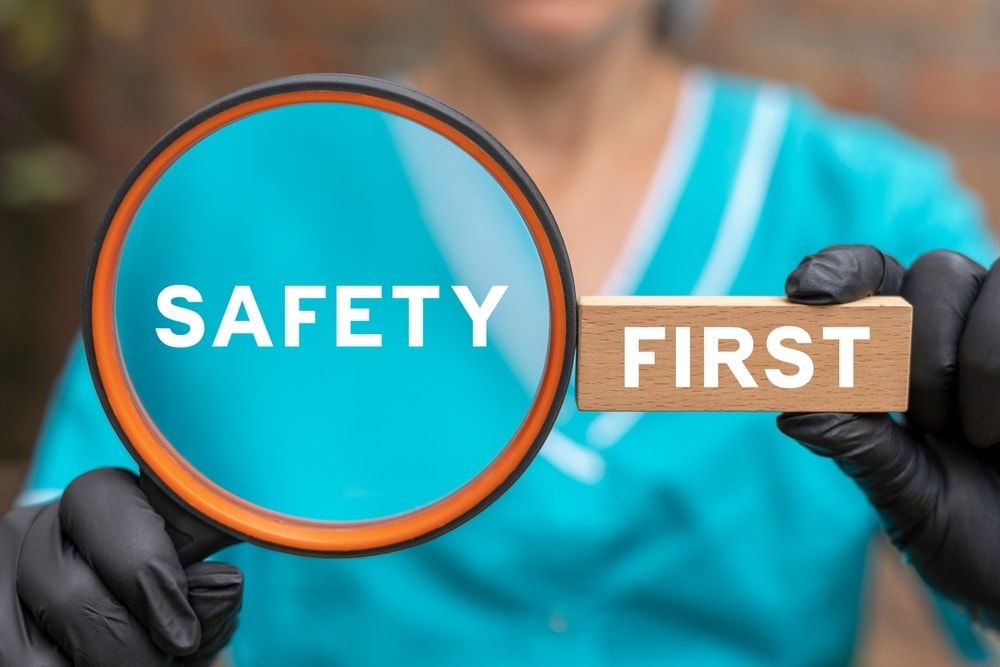
AB 1774 addresses growing concerns around the misuse of high-speed e-bikes, which have been linked to an increase in serious crashes and injuries. The law:
- Helps prevent unsafe modifications that can disable braking cutoffs or exceed safe speeds
- Allows law enforcement to better identify noncompliant vehicles on the road
- Supports public safety initiatives in areas with high pedestrian and cyclist traffic
🟡 Open Question: Will AB 1774 be accompanied by public awareness campaigns or rider education efforts?
The legislation aligns with other recent e-bike safety measures in California, including Assembly Bill 2234 which allows San Diego Cities to restrict children under 12 from riding Class 1 and 2 e-bikes.
Financial and Implementation Considerations
AB 1774 passed with a majority vote and was reviewed by the fiscal committee. However, it does not provide appropriations or funding for implementation at the local level.
The bill specifically states that the State will not reimburse local governments for costs associated with implementing the law. This means cities and counties will need to absorb any additional expenses related to enforcement within their existing budgets.
For e-bike retailers and manufacturers, compliance may require:
- Removing non-compliant products from inventory
- Updating marketing materials and product descriptions
- Training staff on the new regulations
- Potentially developing compliant alternatives to meet consumer demand
🟡 Open Question: What resources—training, staff, equipment—will local agencies need to enforce these new rules?
These implementation challenges reflect broader trends documented in 2022 Bicycle Injury & Fatality Statistics (2024 Data): Cyclist Deaths On The Rise in the U.S., which highlights the growing need for e-bike regulation nationwide
Final Thoughts
Assembly Bill 1774 marks a significant step in California's ongoing effort to regulate e-bikes for safety and compliance. By targeting both riders and retailers, the state seeks to eliminate loopholes enabling unregulated high-speed bicycles on public roads.
As the law takes effect:
- Riders must be aware of what constitutes a legal e-bike
- Retailers must remove noncompliant items from inventory
- Authorities must find efficient, cost-effective ways to enforce the law without state funding
California's message is clear: e-bikes are welcome, but only when they're safe, legal, and responsibly used. Cyclists, parents, and retailers should be aware of these updates. Riders modifying their bikes illegally not only risk their safety but also their legal standing on California roads.
For more information about e-bike regulations and safety, visit our guides on everything you need to know about e-bikes and California bicycle laws.
Ride Protected. Ride Safe with Bike Legal
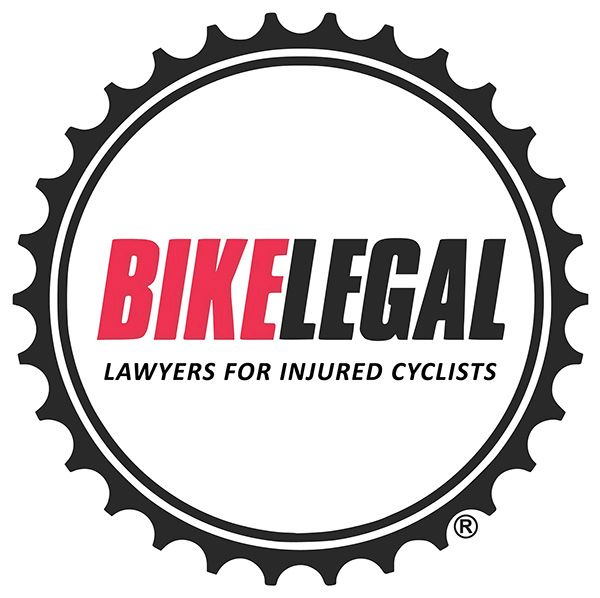
At Bike Legal, we are cyclists representing injured cyclists, including riders of electric bicycles. As dedicated bicycle accident attorneys, we bring unmatched expertise in bicycle and e-bike accident law and a deep understanding of the cycling community. We fight for justice and fair compensation for injured riders.
Beyond legal representation, we're passionate advocates for bicycle safety, rider education, and the importance of sharing the road responsibly.
If you've been injured in a bicycle or e-bike accident or have questions about your rights, we're here to help.
📞 Call 877-BIKE LEGAL (877-245-3534) for a FREE Consultation.
Frequently Asked Questions About AB 1774
1. Is modifying my e-bike to go faster than 28 mph illegal?
Yes—unless your modified e-bike still meets California's definition of an electric bicycle (under 750 watts and properly relabeled), it becomes a motor vehicle. It must comply with licensing, registration, and insurance laws under the California Vehicle Code.
2. Can I still buy e-bike speed upgrade kits online?
Under AB 1774, it is now illegal to sell or distribute devices that modify an e-bike's speed capabilities beyond the legal limit in California, including online. Enforcement of online platforms remains a challenge, but selling these devices within California is now a criminal offense.
3. What happens if I'm caught riding a modified e-bike that's no longer classified as legal?
You could face citations, fines, bike confiscation, and criminal charges. You may also lose the legal protections granted to riders of compliant electric bicycles, including exemptions from registration, licensing, and insurance requirements.
4. Does AB 1774 change how manufacturers label e-bikes?
No, the classification labeling requirement already existed under Section 312.5. What AB 1774 does is clarify that modified bikes must still meet legal definitions and have labels updated if the classification changes.
5. Is enforcement of AB 1774 already happening?
Yes—the law is now in effect as of July 2, 2024. However, full enforcement depends on local agency resources and guidance, which may still be in development across different California jurisdictions.
